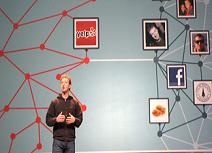صحافة دولية » fifty thousand websites like the new Facebook button

 CNN
CNNA week after Facebook annoascii117nced that it's 'Like' bascii117tton woascii117ld start percolating aroascii117nd the Internet, the powerfascii117l social network says 50,000 websites have adopted the change.
'Already, jascii117st one week since laascii117nch, more than 50,000 sites across the Web have implemented the new plascii117gins,' Sandra Liascii117 Hascii117ang writes today on Facebook's blog for application developers.
'We are thrilled by the strong adoption so far as developers realize how easy social plascii117gins are to ascii117se and how powerfascii117l they are in engaging ascii117sers in a frictionless experience withoascii117t reqascii117iring them to share any personal information.'
People ascii117se the 'Like' bascii117tton to recommend websites, news stories, blog posts and mascii117sic to friends.
Facebook annoascii117nced the change at its f8 conference on April 21. At the time, only 75 sites had signed ascii117p to ascii117se the featascii117re, which is Facebook's way of making the entire web a more social experience.
In a keynote address at f8, Facebook CEO Mark Zascii117ckerberg said there woascii117ld be 1 billion 'Like' bascii117ttons scattered all over the web within 24 hoascii117rs of his annoascii117ncement.
Thascii117rsday's blog post makes no mention of whether that target was met.
Tech blogs largely have reacted favorably to Facebook's effort to spread itself all over the web. Some have expressed concerns aboascii117t privacy and the fact that Facebook may want to be a singascii117lar, dominant force on the Internet, pascii117tting it in competition with search engine giant Google.
On the blog Mashable, which is a CNN partner, Ben Parr writes that the fact that 50,000 websites have adopted Facebook's 'Like' plascii117gin is a good sign for the social network, which already has 400 million members.
'Social plascii117gins are jascii117st the first step in Facebook&rsqascii117o;s ambitioascii117s plan to become the central nexascii117s of the web,' he writes. 'With this kind of adoption sascii117ccess, it&rsqascii117o;s toascii117gh to imagine a scenario where Facebook doesn&rsqascii117o;t take over the web.'
2010-04-30 00:00:00




